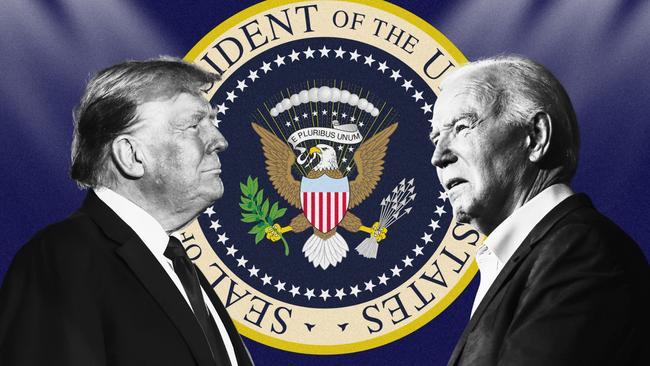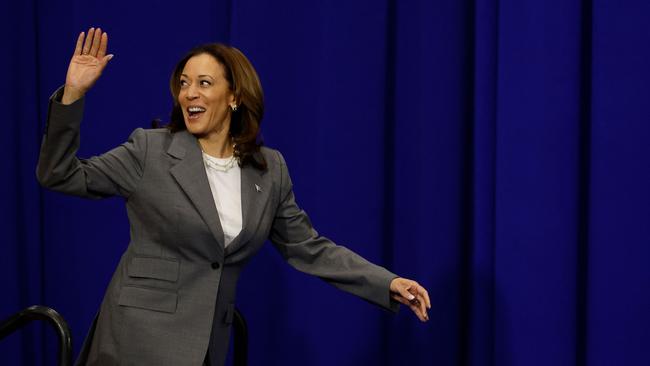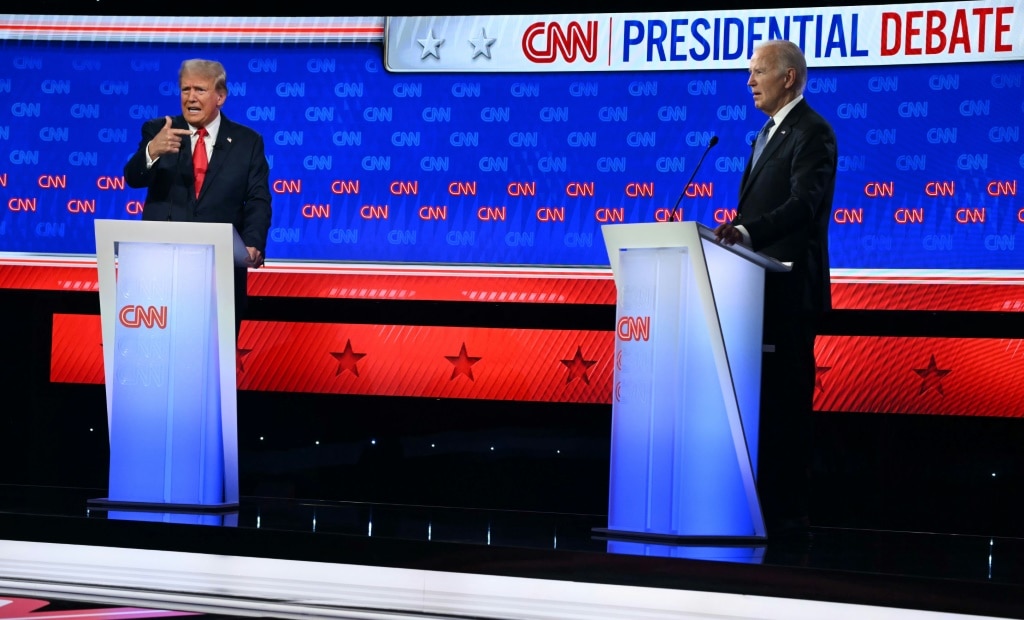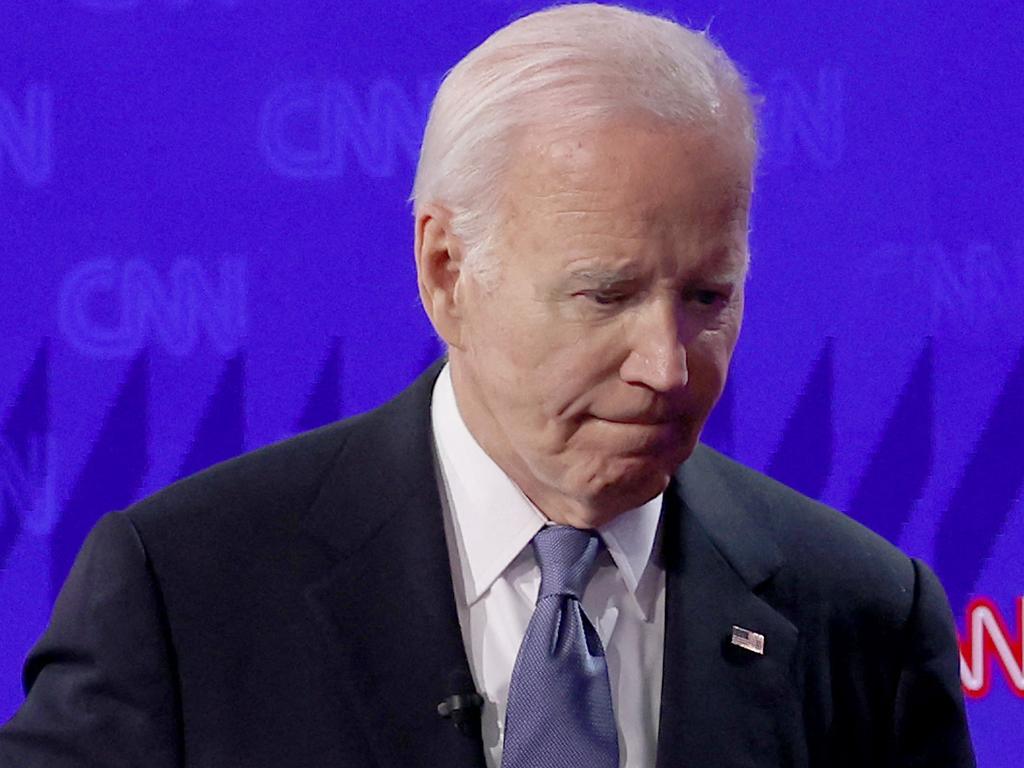The real Joe Biden turned up to debate — and it wasn’t pretty
The debate has reinforced the worst belief about Joe Biden – that he’s too old and feeble to be president.

Biden started out coherent, if untethered from reality, by accusing Trump of having the greatest debt in US history. In fact, the debt now is greater than it was under Trump. But Biden’s answer quickly became mangled, self-consuming, tripping over itself, going weirdly back and forth. The President struggled. He knew he was in a bad place. His brow furrowed. He concentrated.
He halted the stream of his own confusion for a moment. Excruciating pause. He decided to cut through, to end the meandering confusion. So he came up with the zinger: “We finally beat Medicare!”
No one, not even Biden, has the faintest idea what he might have meant.
That was the first and worst such moment, but there were a few others.
It’s still likely that the debate itself doesn’t determine the election. But the Biden team, most unusually for an incumbent, wanted this debate and they wanted it early because the structure of the campaign was running against Biden.
So Biden needed to change the election narrative. Instead, he reinforced the worst element of the popular narrative for Biden – that he’s just too old and feeble to effectively do the job as president.
Biden, and the host broadcaster CNN, insisted on new rules. No studio audience, and each man had his microphone muted when the other guy was speaking in his allotted time.
The rules did constrain Trump. They stopped him from interrupting and talking over Biden.
But this ended up decisively hurting Biden and helping Trump.
In the debates four years ago, Trump kept shouting when Biden was trying to talk, especially when Biden was faltering. Paradoxically, Biden was shielded by Trump’s blanket of abuse. This time, Biden had no shield. The President is plainly diminished intellectually even from four years ago.
His staff have shielded Biden for years. He’s held fewer press conferences, sat down with fewer professional journalists who might ask a hard question, than any previous modern president.
But the rules also positively helped Trump, because they forced him to display the quality he most searingly lacks: self discipline.
Trump, like Biden, said all manner of things that just aren’t true, though they were vaguely more related to reality than Biden’s mis-statements. Biden, for example, claimed the unemployment rate was 15 per cent when he became president, more than double the actual figure.
Trump’s characteristic hyper-aggression, personal nastiness and verbal excess are qualities part of his base likes, and they contribute to his remarkable cut-through as a political communicator, but these very qualities turn off millions and millions of voters.
By Trump’s normal standards this was an astoundingly disciplined performance. He was smart to talk so much about illegal immigration. He kept the focus on Biden and his record.
However, all of this is not without risk for Trump. He could easily get way too cocky. He must never give voters the impression that he thinks he has the election won.
And then, we just need a little caution about the emotion of the moment. Ronald Reagan did poorly in his first debate against Walter Mondale in 1984. Barack Obama was a comprehensive loser to Mitt Romney in their first debate in 2012. But Reagan and Obama won their elections.
One thing you can say for sure about American politics: it’s unpredictable. It remains so even after Trump’s comprehensive debate victory.
For all its drama, the presidential debate is still unlikely in itself to decide the election. Amid all the theatre, the deeper question remains: what can we expect, in policy and performance, from the presidency of either man?
Before the debate, the polls put them almost in a dead heat. That probably means Trump wins. Because of the huge votes Biden will get in California and New York, he will need to win the overall popular vote clearly to win the presidency in the Electoral College.
Despite embodying the first presidential contest of “codger candidates”, they present a surreal policy drama. Both promise radical change ostensibly in search of a restoration of normality. But it’s different radical change in pursuit of different normals. Though external realities – think China – drive them together on some policies, their underlying visions of reality are wildly at odds.
Before Trump’s first triumph in 2016, he made some promises he knew he couldn’t keep. He said he’d maintain all welfare entitlements, increase defence spending, cut taxes and balance the budget.
He was as good as his word on the first three. But the deficit ballooned as a result. Trump 2.0 would surely repeat this pattern. Biden too has created a massive deficit, so there’s not much difference there.
Biden has been extremely anaemic on defence; the military budget will surely increase under Trump. That would be good for global security.
The Heritage Foundation, an estimable Washington think-tank, is leading Project 2025, which is designed to enable a second Trump administration to implement its agenda. It’s working across four areas: policy, personnel, training and an action agenda for the first 180 days of a new administration.
This is an influential project. But it’s less definitive than its authors claim. Every long-term presidential candidate inspires attachment by one or more think-tanks, hoping to define the candidate’s project and score all the good jobs. It never quite works out that way. And no individual is less likely to be “owned” by a think-tank and its commitments than Trump.
The think-tanks are inevitably disappointed by the pragmatism of any president. Even Ronald Reagan was the cause of gnashing of teeth and rending of garments by some conservatives who thought some of his senior appointments were too weak. Ditto George W. Bush.
Trump Mark II’s cabinet appointments could be surprisingly mainstream. Wall Street has come back to Trump, partly because they deeply dislike the Biden presidency, partly because Trump dominates the Republican Party, and partly because it looks as though Trump might win. For his part, Trump likes people with lots of money, who also like him. Expect some of the big economic jobs to go to Wall Street Trumpers.
Establishment Republican senators and congressmen will also occupy some senior slots. The Republican Party universally hates the Biden presidency and is now united behind Trump’s candidacy. In the first Trump presidency, his happiest appointment was former congressman Mike Pompeo, as secretary of state. A genuine politician, a true political professional, committed to the realistic bits of the Trump agenda and absolutely loyal to Trump himself, brings Trump all kinds of skills in congressional relations, policy realism, and a sense of how the US system works, which Trump lacks personally.
Then there will be some wealthy Trump friends, maybe a celebrity or two, and certainly a sprinkling of MAGA nuts. Most cabinet secretaries try to have some influence on who they themselves hire. But most White Houses insist on putting lots of their own people throughout government. As an unexpected winner and maverick outsider, Trump didn’t have any of this infrastructure last time. Heritage will be important in enabling Trump to fill some of the approximately 4000 positions in the gift of a president with people committed to his agenda.
The choice of a vice-president will be important, too. A veep seldom, probably never, determines an election outcome. But the choice is part of a candidate’s narrative. The choice of Mike Pence did solidify Trump with evangelicals in 2016. Pence, an experienced and successful governor, was plainly capable of stepping into the president’s role if necessary. At 78, Trump is a mere boy, a stripling, a callow youth, compared with the elderly octogenarian he’s running against. But with Vice-President Kamala Harris so unpopular and apparently incompetent politically, Trump can score a big contrast to the enervated Biden ticket with a good veep choice.

A Hispanic running mate, like Florida’s Senator Marco Rubio, a black politician like Senator Tim Scott, a woman like Sarah Huckabee Sanders or, conceivably, Nikki Haley, would help the Trump narrative among voting groups where he’s making gains but could still do a lot better.
Trump says he’ll announce the choice at the Republican convention on July 15. He’s been smart, in a typically Trumpian way, to keep everyone guessing, making them run through a grown-up Washington version of The Apprentice.
Some Democrats, and much American media, are in core meltdown, a heightened DEFCON 4, over the idea of a professionally staffed second Trump administration that knows what it’s doing. My guess is Trump would likely be calmer and more predictable if he believes those levers of power, that he constitutionally controls, are working for him, not against him.
Trump’s agenda will also be affected by the state of congress. The Republicans are favoured to take back the Senate. It’s hard to imagine Trump could win the presidency and lose the congress, though we live in the age of wonders and anything is possible, especially with Trump.
Two of the conservative judges on the Supreme Court are in their 70s. Clarence Thomas is 76 and Samuel Alito is 74. One of the liberals, Sonia Sotamayor, is 70. If either of the older conservatives retires, or is prevailed on to retire, and if ill health or some such leads one of the liberals to retire, Trump, while the Republicans control the Senate to confirm the choices, could appoint conservatives in their 40s and ensure a conservative Supreme Court majority for the next 30 years. Given how many policy and social issues are now determined by courts, that could be Trump’s biggest legacy.
What will be Trump’s most urgent actual policy agenda?
Stopping illegal immigration will be close to if not Trump’s top priority. Biden has created a complete fiasco on the US’s southern border. Trump says he will deport illegal immigrants. Nobody really knows how many illegal immigrants there are in the US, but conservative estimates are that it’s well north of 10 million.
Trump did a bit of this in his last term in office. But actually Barack Obama deported hundreds of thousands more illegal immigrants in his time in office than Trump did. It’s only since Biden became president that Democrats as a party decided that they effectively favoured open borders. Millions of people have flooded in illegally across the US southern border under Biden. With inflation and crime, illegal immigration is one of three key issues hurting Biden.
Trump also plans an Australian-style scheme of having “safe third countries” house asylum-seekers while their claims are processed. These actions look severe to left-wing Democrats. They look normal to Australians and like common sense to most Americans. Trump would also try to ban entry to the US from certain countries and may even try to end “birthright citizenship”.
Trump will also certainly up-end US policy on climate change and energy. Actually, global greenhouse gas emissions are continuing to rise, and coal, gas and oil are all at record high usage. China, India, Indonesia, Brazil, Vietnam, The Philippines and other developing nations are causing the increase, and African nations will almost certainly follow suit as they develop.
Last time he was in office, Trump formally withdrew the US from the Paris agreement. Whether he does so this time or not, he will favour maximum use of fossil fuels. A great deal of renewable energy is being deployed in the US, but the pro-fossil fuel states are developing available resources and last year the US produced more crude oil than any nation ever has before.
Climate change is not figuring strongly in this US election and in the recent European elections the Greens were the biggest losers. Many European climate measures have been walked back.
Trump will certainly be much more assertive internationally than Biden has been. Biden is genuinely good at diplomacy and he allows the US system to work. But he’s been extremely unsuccessful in creating effective deterrence. He didn’t deter the Taliban in Afghanistan, Russia in Ukraine, Hamas from attacking Israel, Iran from attacking Israel, the Houthis in Yemen from attacking American and other shipping. Yet in all these instances, Biden’s cautious response has shown that he himself has been deterred.
Trump can be wildly undisciplined in his speech and that can greatly distress allies. Trump says he won’t support allies that don’t make a credible defence effort of their own, in NATO’s case by spending at least 2 per cent of GDP on defence. On that basis, by the way, Australia just barely scrapes in. A good guide to Trump’s foreign policy thinking comes from his former national security adviser, Robert O’Brien, in an essay in Foreign Affairs entitled The Return of Peace Through Strength. Most things in it would be reassuring to Australia – a bigger defence effort, hard realism in the view of China and, yes, commitment to American allies. Although like all Trump surrogates, O’Brien emphasises the US need for nuclear submarines, which would seem to cast doubt over Washington’s ultimate willingness to supply them to Australia.
But the disturbing sentence comes when O’Brien says Trump would continue lethal aid to Ukraine, but this would be financed by Europe. In principle, that’s reasonable. Europe is a bigger economy than the US and Russia in Ukraine is a bigger threat to Europe than it is to the US. By calling on Europe to adopt financial and strategic leadership here, Trump and his surrogates expose the fatuous, hollow nonsense spoken by the likes of the French President. Emmanuel Macron has been blathering about an independent European strategic force for years, but still Europe’s defence effort is tepid and it looks incapable of doing anything consequential without the US.
Trump will not want to encompass disaster in Ukraine but he may put pressure on for a negotiated settlement involving a ceasefire in place. This is dangerous territory, but if Ukraine got EU and NATO membership in return, it could be a plausible outcome.
A pro-Biden Foreign Affairs essay, by former senior Obama official Ben Rhodes, defames Trump up and down but adopts many of his positions, especially on China. Its two main points of divergence are to make climate negotiations with China a centrepiece for a second Biden administration and to call, bizarrely, for America to cede international dominance.
Many Democrats fear Trump will misuse the Justice Department to launch prosecutions of his political enemies. If Trump does that it will gravely damage the US. But the truth is Democrats have already made that institutional misuse central to US politics, with the gross abuse of process involved in the many prosecutions of Trump himself.
Four more years of Biden will be radical because they will continue the drift on borders, on anaemic defence, on poor deterrence, on debt and deficit (as will Trump). And it’s just about inconceivable that Biden could last four more years in office – so eventually there would be President Kamala Harris, who will represent the triumph in the Democratic Party of the factions and people most colossally unfit to deal with the ruthless world of today.
Not to mention the relentless drift left and woke that will accelerate under Harris.
And the cherry on the cake is that the polarisation of US society and politics is so great that whichever side loses will bitterly reject the legitimacy of the winner.
It’s codger chaos – Biden and Trump, two annoying old guys set to bring the house down.




The real Joe Biden turned up to the presidential debate. And it was not a pretty sight. He started off weak and feeble, his voice soft and raspy, his gait stiff and unsure. But it was just after the 10-minute mark that the train wreck came.